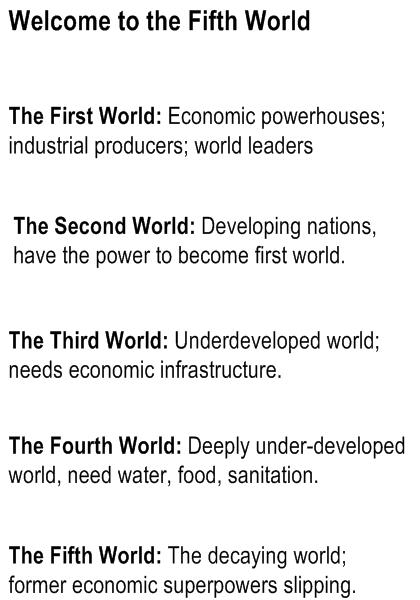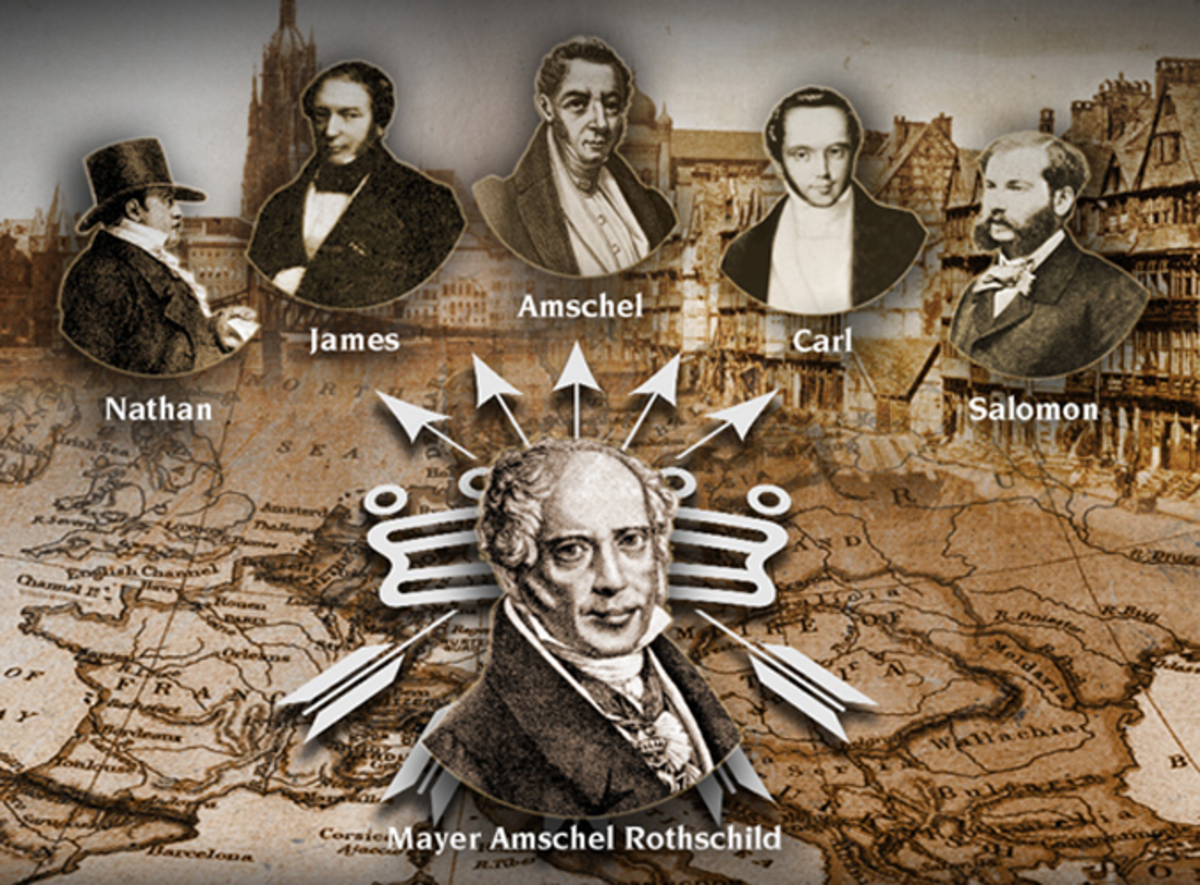No Economic Recovery Coming: Welcome to the Fifth World
The United States Enters the Fifth World
Last year, a friend of mine got two offers for the entire crop from his pecan farm in New Mexico: Sell it to the Mexicans, or sell it to the Chinese. Every year, unimaginable amounts of crops, lumber, steel, and other raw materials head down the Columbia and Snake Rivers, out of Portland, and across Asia to the Pacific. The US supplies $15 Billion worth of raw materials for manufacture in Japan, Taiwan, Signapore, South Korea and China.
First world countries take raw materials from second and third world countries, and make them into manufactured goods. That is what gives these first world countries the economic power to rule the world. Before World War II, England was a first world country drawing raw materials from India and China to manufacturing facilities in England, and the British Empire ruled the world. After the war,with the loss of her colonies, England suffered a great deal as the Soviet Union and the United States took over the economic and political leadership of the world. Then the Soviet Union broke apart, and it dropped out of First World status. Europe united 27 separate nations into one economic powerhouse, strengthening its First World position.
Is this sunset for the US as an economic superpower?

The Five Economic Worlds

The Five Worlds in the World Economy
The First World is the economic superpowers, originally the US and the Soviet Union. The Second World originally was their allies. Now, it is nations that are developing strong economies and are powerhouses in world trade. The Third World was originally non-aligned nations, then came to refer to the developing world - nations that supply raw materials and can develop economically. This led to acknowledgment of the existence of a Fourth world: nations so poor that the basics of survival are needed before economic development can be addressed. The people of the Fourth World need water, food, sanitation, and the safety of a functioning government to survive.
To make sense of what is happening in the US economy today, we need to introduce a fifth world into our thinking. The first four worlds were based on the modern notion of economic progress. But unending progress is not the true course of history. Babylon fell. Rome fell. The British Empire fell. Recently, the Soviet Union fell. Now, the US is falling.
I use the term Fifth World to refer to the former economic superpowers who are unlikely to regain their economic strength within the next half-century. The United States is now a Fifth World Country. I say this to reinforce the view that anyone expecting significant, lasting recovery for the US economy is not looking at the larger social and production issues facing our country.
Global and local issues
If we look only at the whole United States, we are not seeing the picture accurately. Although the US was considered a First World power for many decades, there are regions and states that, considered by themselves, have remained closer to the Third World in their economy. Of course, they have had the benefit of central government created by an electoral process, which is not true for many Third Word countries. But, as the US as a whole slips into the Fifth World, the experiences will be very different in, say, New Mexico, Florida, and New York City.
A similar point can be made about the European Union. Nations in the EU range from having living standards well above the US to being Third World countries.
Why the Soviet Union Fell and the US is Falling
The Soviet Union was pressured to exceed its economic capacity through the arms race and the space race with the United States. The US was ahead in both races since the mid-1960s, but used propaganda to claim it was behind in firepower and space capability, pushing the Soviet economy to the breaking point.
The Soviet Union had a geographical weak point in Afghanistan, and tried to suppress the tribes there. The US supplied the tribes with weapons and training (using their ally at the time, Osama bin Laden) to drain the Soviet economy to the point of collapse. The Soviet Union collapsed with the fall of the Berlin Wall in November 1989.
From a power politics perspective, the US strategy could be considered brilliant. But the US failed to learn from its own brilliance, and allowed itself to follow the path of the Soviet Union. The Vietnam, First Iraq, Afghanistan, and Second Iraq wars have drained our economy, and we crossed our own breaking point almost five years ago, in October 2007, with the collapse of the stock market and bursting of the real estate bubble.
What about the European Union?
The European Union (EU) is an effort by the nations of Europe to unite economically, and to gain greater economic independence from the US. Most of the countries in the EU are Second World nations; though some are closer to Third World status. The EU effort is historically important - it is the first peaceful effort to unify the cultures and nations of Europe, which have a history of war going back hundreds (or, depending on how you look at it, thousands) of years.
The EU has one major advantage over the USSR and the US: It has not been involved in any devastating, economically draining wars. And another - it includes some nations with the highest standards of living on Earth. But the EU does face many challenges: complexities of linguistic and cultural diversity; a broad range of economic power and standards of living; the challenges of creating the Euro as a unified currency; ancient cultural rivalries; and, most recently, economic failure of some EU governments. Certainly, Europe benefits from the EU. How long those benefits will last.is uncertain. So it is unclear whether the EU will move through the current turmoil (largely caused by the economic difficulties of the US and manipulation of stock and money markets), or follow the US down the slippery slope of becoming a set of fifth world nations.
Immigration is a major issue for the EU. It creates complex linguistic and cultural challenges while straining the economies of nations receiving new immigrants flowing in from poorer parts of the world.
The US in the Fifth World: Living in a Decaying Economy
What is it like to live in a nation with a decaying economy?
No one knows. No one has ever done it before.
In the Soviet Union, the fall from First World status was accompanied by a political breakup. The fate of each nation depended on politics and war. East Germans had the benefit of reuniting with West Germany. Serbs, Croats, and Bosnians, suffered from a horrific war. Slavs and Czechs managed peaceful partition.
But the United States faces a very different journey. We remain a political unit, even as our economy falls, language barriers grow, education falters, and social fragmentation increases. Our political unity allows us to deny our economic collapse and growing social tensions. And general denial makes practical recognition and action much more difficult.
For now, each farmer, miner, and manufacturer will make the decision best for his or her own company. Each worker will make the decision best for his or her own family. Each city, county, and state will make choices that has consequences for its residents. Things are very up-in-the-air in the short term - meaning years and decades.The long-term trends - looking several decades and beyond - are more predictable.
The US had two basic advantages that made us a political and economic superpower - ingenuity and vast natural resources. We are losing the edge on ingenuity, and, in manufacturing, we've lost it. We are draining our natural resources. The small nations of Asia, learning from the Japanese, are becoming the new manufacturing centers. China and India, with their vast populations, are slowly following suit. Over the next 50 to 100 years, if China and India do not get involved in major wars, if they manage their population and cultural issues, and if they continue to grow technologically, they will rise to First World status as nations. Regions within China and India, of course, will remain poor, as they have in the US.
Will the US recognize its new status in the world economy? Will we develop effective survival strategies? How can individuals thrive in the world's first Fifth World former superpower? And what are the long-term effects of global climate change and toxic waste on the economy and the livability of our planet?
For thoughts about all of this - thoughts - not answers, for no one has the answers without a crystal ball - stay tuned to future hubs.








